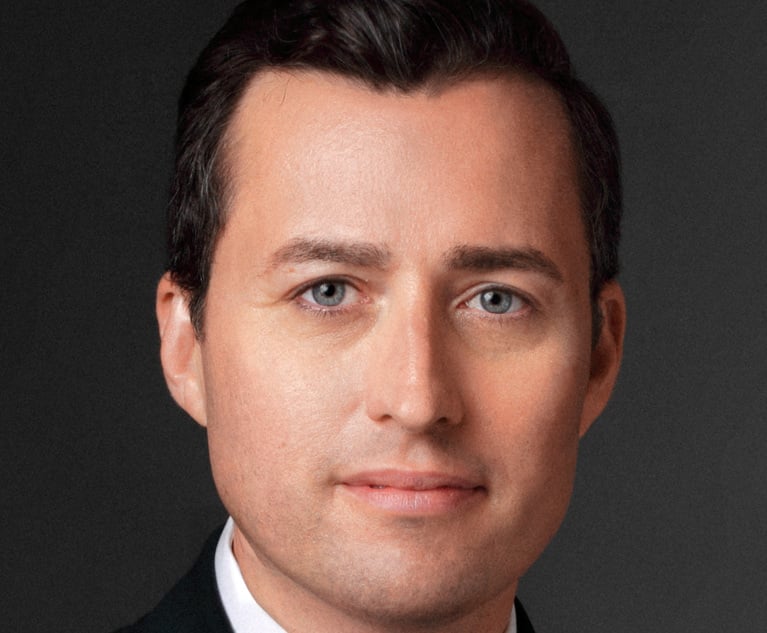Del. Court Orders Insurers to Provide Coverage in $486M Settlement of Pfizer NY Shareholder Dispute
A Delaware judge has ruled that two of Pfizer Inc.'s insurers must cover the costs associated with a $486 million settlement in a New York shareholder suit that accused the pharmaceutical giant of misleading investors about the health risks associated with two anti-inflammatory drugs.
July 26, 2019 at 04:07 PM
4 minute read
 Photo: Shutterstock.com
Photo: Shutterstock.com
A Delaware judge has ruled that two of Pfizer Inc.'s insurers must cover the costs associated with a $486 million settlement in a New York shareholder suit that accused the pharmaceutical giant of misleading investors about the health risks associated with two anti-inflammatory drugs.
The ruling said Pfizer's excess insurers, Arch Insurance Co. and U.S. Specialty Insurance Co., could not rely on a “special litigation exclusion” in their director and officer policies to deny coverage based on another securities class action they claimed was identical to the case in Manhattan federal court.
In a 27-page ruling, Delaware Superior Court Judge Paul R. Wallace sided with Pfizer in finding that though aspects of the cases overlapped, there were still distinct differences between the two, which prevented the insurers from avoiding their coverage obligations.
“In short, while there may be some thematic similarities, the underlying actions are truly, in all relevant respects, different,” Wallace wrote in the decision dated Tuesday.
The dispute stemmed from long-running litigation in the Southern District of New York, which accused Pfizer and its then-chairman and CEO, Henry A. McKinnell, of hiding cardiovascular risks associated with Celebrex and Bextra. The case, referred to in Wallace's opinion as the “Morabito action,” settled in 2016, with Pfizer agreeing to pay $486 million, on top of the $82 million it had incurred in defense costs over the 12-year life of the lawsuit.
According to court documents, Pfizer annually purchased insurance to cover third-party claims for wrongful conduct against its directors and officers, and had 13 layers of insurance providing $225 million in coverage in excess of a $10 million self-insured retention.
In the wake of the Morabito action, however, Arch and U.S. Specialty refused coverage, saying the case was “unquestionably related” to another securities class action in which investors in Pharmacia Corp. sued over false and misleading representations in a study Pharmacia had commissioned regarding Celebrex's gastrointestinal health risks. Pharmacia, a Swedish pharmaceutical and biotechnological firm, was later acquired by Pfizer in 2003.
The insurers argued that the language of the policies precluded coverage, so long as the two cases “share any commonality.”
But Wallace called that reading “strained and uncharacteristically broad,” in light of previous Delaware rulings that found coverage to be precluded only when the two underlying claims were “fundamentally identical” and involved the same subject.
The “Garber case,” as it is called in the decision, was brought by Pharmacia stockholders over misstatements regarding Celebrex's gastrointestinal risks, whereas the Morabito action focused on cardiovascular concerns surrounding Celebrex and another drug, Bextra, Wallace said.
“Although both are class action lawsuits alleging securities violations, the Garber action and Morabito action do not cover the 'same subject' and the special litigation exclusion, therefore, does not preclude coverage,” Wallace said.
Attorneys for Pfizer declined to comment, and an attorney for the insurers did not return a call Friday seeking comment on the ruling.
Pfizer was represented by Robin Cohen, Adam Ziffer and Marc Ladd of McKool Smith in New York and John P. Ditomo, Kenneth J. Nachbar and Barnaby Grzaslewicz of Morris Nichols Arsht & Tunnell in Wilmington, Delaware.
Arch and U.S. Specialty were represented by Erica J. Kerstein of White & Williams in New York, Marc S. Casarino from the firm's Wilmington office, Carmella P. Keener of Rosenthal, Monhait and Goddess in Wilmington and Matthew J. Dendinger of Loss, Judge & Ward in Washington, D.C.
The case was captioned Pfizer v. Arch Insurance.
This content has been archived. It is available through our partners, LexisNexis® and Bloomberg Law.
To view this content, please continue to their sites.
Not a Lexis Subscriber?
Subscribe Now
Not a Bloomberg Law Subscriber?
Subscribe Now
NOT FOR REPRINT
© 2025 ALM Global, LLC, All Rights Reserved. Request academic re-use from www.copyright.com. All other uses, submit a request to [email protected]. For more information visit Asset & Logo Licensing.
You Might Like
View All
Insurance Company Sues Over 180 Health Care Providers for Fraud Under RICO
3 minute read
New York Court of Appeals Tightens Pleading Standards Against Insurance Policyholder
7 minute read
Amid Growing Litigation Volume, Don't Expect UnitedHealthcare to Change Its Stripes After CEO's Killing
6 minute read
GE Agrees to $362.5M Deal to End Shareholder Claims Over Power, Insurance Risks
2 minute readTrending Stories
- 15th Circuit Considers Challenge to Louisiana's Ten Commandments Law
- 2Crocs Accused of Padding Revenue With Channel-Stuffing HEYDUDE Shoes
- 3E-discovery Practitioners Are Racing to Adapt to Social Media’s Evolving Landscape
- 4The Law Firm Disrupted: For Office Policies, Big Law Has Its Ear to the Market, Not to Trump
- 5FTC Finalizes Child Online Privacy Rule Updates, But Ferguson Eyes Further Changes
Who Got The Work
J. Brugh Lower of Gibbons has entered an appearance for industrial equipment supplier Devco Corporation in a pending trademark infringement lawsuit. The suit, accusing the defendant of selling knock-off Graco products, was filed Dec. 18 in New Jersey District Court by Rivkin Radler on behalf of Graco Inc. and Graco Minnesota. The case, assigned to U.S. District Judge Zahid N. Quraishi, is 3:24-cv-11294, Graco Inc. et al v. Devco Corporation.
Who Got The Work
Rebecca Maller-Stein and Kent A. Yalowitz of Arnold & Porter Kaye Scholer have entered their appearances for Hanaco Venture Capital and its executives, Lior Prosor and David Frankel, in a pending securities lawsuit. The action, filed on Dec. 24 in New York Southern District Court by Zell, Aron & Co. on behalf of Goldeneye Advisors, accuses the defendants of negligently and fraudulently managing the plaintiff's $1 million investment. The case, assigned to U.S. District Judge Vernon S. Broderick, is 1:24-cv-09918, Goldeneye Advisors, LLC v. Hanaco Venture Capital, Ltd. et al.
Who Got The Work
Attorneys from A&O Shearman has stepped in as defense counsel for Toronto-Dominion Bank and other defendants in a pending securities class action. The suit, filed Dec. 11 in New York Southern District Court by Bleichmar Fonti & Auld, accuses the defendants of concealing the bank's 'pervasive' deficiencies in regards to its compliance with the Bank Secrecy Act and the quality of its anti-money laundering controls. The case, assigned to U.S. District Judge Arun Subramanian, is 1:24-cv-09445, Gonzalez v. The Toronto-Dominion Bank et al.
Who Got The Work
Crown Castle International, a Pennsylvania company providing shared communications infrastructure, has turned to Luke D. Wolf of Gordon Rees Scully Mansukhani to fend off a pending breach-of-contract lawsuit. The court action, filed Nov. 25 in Michigan Eastern District Court by Hooper Hathaway PC on behalf of The Town Residences LLC, accuses Crown Castle of failing to transfer approximately $30,000 in utility payments from T-Mobile in breach of a roof-top lease and assignment agreement. The case, assigned to U.S. District Judge Susan K. Declercq, is 2:24-cv-13131, The Town Residences LLC v. T-Mobile US, Inc. et al.
Who Got The Work
Wilfred P. Coronato and Daniel M. Schwartz of McCarter & English have stepped in as defense counsel to Electrolux Home Products Inc. in a pending product liability lawsuit. The court action, filed Nov. 26 in New York Eastern District Court by Poulos Lopiccolo PC and Nagel Rice LLP on behalf of David Stern, alleges that the defendant's refrigerators’ drawers and shelving repeatedly break and fall apart within months after purchase. The case, assigned to U.S. District Judge Joan M. Azrack, is 2:24-cv-08204, Stern v. Electrolux Home Products, Inc.
Featured Firms
Law Offices of Gary Martin Hays & Associates, P.C.
(470) 294-1674
Law Offices of Mark E. Salomone
(857) 444-6468
Smith & Hassler
(713) 739-1250






